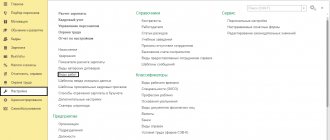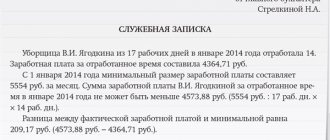Very often, an overpayment of salary to an employee can be caused by vacation, or more precisely, by its overexpenditure or advances that were not worked out.
The first option assumes that the person received vacation before the worked period - at the moment when the company employee wrote a letter of resignation, but the vacation money had already been issued, and the vacation time itself was not worked, thereby being converted into excess wages. The second option is based on the employee receiving an advance, after which the person quit without working out the accrued funds. Not every manager knows what to do if a dismissed employee is overpaid. There may be several ways out of this situation.
The employee returns the money himself
An employee can deposit money at the organization's cash desk (Debit 50 Credit 70) or transfer it to a current account (Debit 51 Credit 70).
If an employee was credited with one amount and paid a larger amount, then according to the turnover of the 70th account, everything will fall into place when the employee makes up for this difference.
In the case where the error was precisely in the arithmetic calculation of wages in accrual, the following entries need to be made:
- Debit 20 (26, 23 ...) Credit 70 – reverse excess payroll
- Debit 73 Credit 70 - write off the excess amount for other settlements with employees
After the amounts for wages have been corrected, do not forget to eliminate the erroneous amounts both for personal income tax (reversing the tax accrual for debit 70 and credit 68 of personal income tax), and for insurance contributions (reversing entry for account 20 (26, 25...) and credit 69 accounts )
Example:
The organization erroneously calculated and paid (minus income tax) a salary of 30,000 rubles to an employee. for May, instead of 28,000 rubles. The employee returned the money to the cashier.
Postings:
| Account Dt | Kt account | Wiring Description | Transaction amount | A document base |
| 26 | 70 | Employee salary accrued | 30 000 | Payroll statement |
| 70 | 68 personal income tax | Personal income tax withheld | 3900 | Payroll statement |
| 70 | 50 | Salary paid for May | 26 100 | Account cash warrant |
| 26 | 70 | The amount of the salary surplus has been reversed | — 2000 | Payroll statement |
| 70 | 68 personal income tax | Personal income tax reversed | -260 | Payroll statement |
| 73 | 70 | The excess amount was transferred to other settlements with the employee | 1740 | Payroll statement |
| 50 | 73 | The employee returned the money to the cash register | 1740 | Receipt cash order |
Lawsuit
The problem, when a dismissed employee was overpaid, how to write off and reimburse the money, concerns many managers of the company.
If the money issue cannot be resolved amicably , then the decision is made by the court, and the money is redirected from account 70 to account 73. If the cash return must be made by an employee of the enterprise, then it is necessary to work with paragraphs 51 and 50. But the opposite outcome of events involves the return of cash with a score numbered 73 to 70.
If the court decision is in favor of the person who worked at the enterprise, then in the tax report the expenses of such a plan will be canceled. If the company wins the case, then the amount must also be canceled in the accounting department.
If the employee wins, insurance premiums are considered legally paid, and the overpaid amount will not need to be returned. There is no need to edit reports.
As for personal income tax, if the company wins, the accounting decision is the same as in the voluntary return of cash by the employee, but if the decision is in favor of the employee, the tax can be considered withheld, and there is no need to adjust the documents.
Employer withholds money
Upon application to the employee, the employer may withhold the overpaid salary himself. To do this, make notes:
- Debit 70 Credit 73 – the excess amount paid was withheld from the salary
In the month of erroneous accrual, reversing entries are made for the calculation of salaries, taxes and contributions.
Example:
The employee wrote an application to deduct from his salary for June (accrued 24,780 rubles) the overpaid amount of 3,500 rubles. for May.
Postings:
| Account Dt | Kt account | Wiring Description | Transaction amount | A document base |
| 26 | 70 | Employee salary accrued | 24 780 | Payroll statement |
| 70 | 68 personal income tax | Tax withheld from salary | 3221,40 | Payroll statement |
| 70 | 73 | Overpaid money withheld from salary | 3500 | Payroll statement |
| 70 | 50 | The employee was paid salary for June minus deductions | 18 058,6 | Account cash warrant |
Refund of overpaid wages: reasons and accounts used
Postings for the return of overpaid wages depend on the reasons causing the need for such a return. Let's look at two common reasons:
- errors were found in the amount of accrued and paid wages;
- salary accruals were made correctly, but a different amount was indicated in the payment order.
In the first case, you need to make the following wiring:
- correcting the accrued salary amount;
- reflecting the employee’s repayment of overpayments.
What accounts can be used when reversing overpaid wages? It all depends on the initial payroll transactions - various accounts may be involved (see the figure below):
For more information about which accounts can be debited with salaries, read this material.
Large companies can calculate salaries using all of these accounts if they have:
- employees of main production departments (payroll: Dt 20 Kt 70);
- employees of auxiliary units (Dt 23 (25, 29) Kt 70);
- management personnel (Dt 26 Kt 70).
In medium- and small-sized companies, there may be fewer accounts involved in payroll. In trade organizations, salaries are calculated using account 44 “Sales expenses”. Incorrectly accrued wages for the overpaid amount must be reversed from the account to the debit of which it was originally accrued.
Refund of overpayment due to errors in the payment order does not require reversal entries for overpaid wages. Accounting reflects only the operation of returning money to the cash desk or to the company's current account.
Results
Postings for the return of overpaid wages depend on whether the amount of earnings is distorted and how the overpayment is repaid (to the cash register or to the current account). If an adjustment to salary accruals is required, it is necessary to reverse the excess accrued amount and the withheld personal income tax. After the employee returns the overpayment, entries are made to the debit of account 50 “Cash” or 51 “Cash accounts” depending on the type of payment (cash or non-cash transfer) in correspondence with account 73 “Settlements with personnel for other transactions.”
You can find more complete information on the topic in ConsultantPlus. Full and free access to the system for 2 days.
Accounting for overpayment
Salaries in accounting are reflected in account 70 “Settlements with personnel for wages”.
As a result of excess wages, a balance appears in this account. If the employee repays the debt, then account 70 will simply “close.” The returned amount will not be subject to personal income tax, pension contributions and injury contributions. If an employee refuses to return the funds, then you must be prepared to recognize these amounts in the financial statements as expenses and liabilities. Therefore, write off the overpayment as other expenses. In this case, an entry is made to the debit of account 91 “Other income and expenses”, subaccount 2 “Other expenses” and to the credit of account 70. In the case of this approach, the economic benefits of the organization are reduced. The advantage of this approach is that such debt is not under the control of the organization, and it cannot expect to receive economic benefits in the future. The unreturned amount is not taken into account when accounting for income tax, is not subject to pension contributions and contributions for injuries, but is subject to personal income tax. The final decision when reflecting the flow of funds in case of excessive payment of amounts is made by the employer and the chief accountant.
It is necessary to take into account that if personal income tax on the specified amount was calculated, withheld and transferred to the budget when it was paid to the employee, there are no grounds for re-calculating and withholding the tax at the time the employer’s debt is recognized as irrecoverable for this amount. The same situation arises in the case of insurance premiums. If the employee voluntarily returns the excess amount received, then personal income tax is adjusted and the base for calculating insurance premiums is recalculated and has the right to a refund or offset of the amount of overpaid social contributions and personal income tax.
Materials from the newspaper “Progressive Accountant”
Features of returning overpaid wages to the cash desk
Payroll calculation is a labor-intensive and painstaking procedure. Despite the widespread automation of this process, an accountant is not immune from errors. Failures in the operation of computer equipment also occur, which can result in incorrect calculations and overpayment of wages to employees.
Having discovered an error, the accountant often makes an automatic deduction from the next month's accruals based on settlements with the employee, making the appropriate entries in accounting. Is such a “simple” way out of the situation legal? In what cases does an organization have no right to withhold excess wages paid? Is an accountant responsible for errors in payroll calculations? Let's find out in the article.
Returns are not always possible
It should be said right away that “automatic” deductions of amounts overpaid to an employee from the next month’s wages or failure to issue part of the wages in cash from the cash register under the same conditions are illegal.
Resolving an unpleasant situation for an accountant should begin with receiving a statement from the employee, in which he asks to withhold the excess amount of money received or undertakes to pay it in cash voluntarily.
It is possible to do without written consent only in some cases described in the Labor Code of the Russian Federation (Article 137):
- the presence of a counting error, i.e. such an error that can be attributed to arithmetic;
- the calculation was made on the basis of false information received from the employee (for example, false documents for personal income tax deduction);
- the calculation was made on the basis of false information from the primary documents for calculating wages (for example, according to the documents, the production output standard was met, but in fact it was not).
As a rule, such situations, in particular, the submission by an employee of false information that affects the calculation of “salary” amounts, are resolved in court (see the Labor Code of the Russian Federation, the same article).
If the employee has expressed in writing his consent to repay the overpayment, the employer can withhold it only for a month after the end of the period specified for the return of advances, debts, and incorrectly accrued amounts of payments.
Counting error and judicial practice
The presence of a counting (arithmetic) error is the most common argument of the employer when withholding overpaid amounts of wages. However, judicial practice in this area most often does not work in favor of organizations.
Example: The Moscow Regional Court, in its ruling No. 33-19764 dated 10/12/10, expressed the opinion that an overpayment cannot be a counting error, but is a consequence of the employer’s incorrect application of labor legislation. According to the judges, the overpayment cannot be attributed to the amounts of unjust enrichment (Civil Code of the Russian Federation, Art. 1109). The employee is not obliged to return the funds overpaid to him. In addition, not all courts recognize a malfunction in an accounting program as a counting error.
Example: The Sverdlovsk Regional Court, in its ruling in case No. 33-7642/2016 dated 04/21/16, did not recognize a technical counting error, but the Samara Regional Court in its ruling No. 33-302/2012 dated 01/18/12 did.
Judicial practice on the application of Art. 137 of the Labor Code clearly indicates that the following cannot be recognized as a counting error:
- payment for a longer vacation than the employee is entitled to by law;
- payment of a larger bonus;
- erroneous payment of double wages for the period.
This is evidenced by numerous decisions of courts of all levels, up to and including the Supreme Court (definition No. 59-B11-17 of 01/20/12).
On a note! Rostrud, in its letter No. 3044-6-0 dated 09-08-07, expresses the point of view according to which, even if there is an undeniable accounting error, the employee’s written consent is required to repay the difference at his expense.
Documentation of the return of excess payments
Having discovered an error, the accountant is obliged to report it to the management of the company. Next, an act is drawn up, which records the fact of overpayment, amount, accrual period and other essential information. Members of the commission signing the act may be: accountant, chief accountant, cashier, etc.
The second copy of the document or its copy is sent to the employee in relation to whom the error occurred. An official letter of notification about the need to repay the overpaid amount within a certain period is attached to the act.
If the employee does not object, then, based on his application, the amount is paid in cash or by non-cash deduction from wages on other terms agreed with the administration. Often such repayment occurs in installments. According to Art. 138 of the Labor Code of the Russian Federation, as a general rule, deduction is possible in the amount of no more than 20% of each salary. It should be taken into account that the employee, in addition to the specified amount to be repaid, may have other deductions.
If an employee agrees in writing to repay the debt in cash at the cash desk or voluntarily deposit it into the company’s account, but this period has expired and the debt has not been repaid, then within the next month the manager issues an order to deduct the amount of the debt from the employee’s salary. If the employee ignores the notice or refuses to repay the overpayment, the employer may go to court.
The issue with an employee who, upon dismissal, received more than what was required by law, is resolved in the same manner as indicated above. It is advisable to immediately indicate in the notice the possibility of going to court if the debt is not repaid. Dismissed employees in most cases refuse to voluntarily repay overpayments.
Voluntary return
In the event that an employee is ready to independently return the overpaid amount, the employer must send him a notice with the following content:
“We hereby inform you that on September 1, 2018, you were mistakenly paid a double bonus. The overpayment amounted to five thousand rubles. Taking into account the provisions of paragraph 4 of Art. 137 of the Labor Code of the Russian Federation, the employer does not have the right to withhold overpaid wages. In this regard, we ask you to consider the issue of voluntarily returning the overpaid amount to the cashier or expressing your will in writing to withhold the amount from wages. Please inform us of your decision in writing within three working days.”
After this, the employee can return the funds to the cash desk using a cash settlement order or write an application for withholding if we are talking about a phased return of amounts. The application must contain the following text:
“I, Ivanova Maria Stepanovna, hereby request, from October 1, 2018, to withhold 20% of the total amount of wages to repay the amount of excess payment in the amount of twenty thousand rubles until the debt is fully repaid.”
After all this, the employer routinely withholds the agreed amount from the employee’s salary. But we should not forget that, by virtue of the provisions of Art. 137 of the Labor Code of the Russian Federation, the employer has the right to make a decision on withholding no later than one month from the date of expiration of the period established for repayment of incorrectly calculated payments. Secondly, according to Art. 138 of the Labor Code of the Russian Federation, the total amount of all monthly deductions cannot exceed 20% of wages.
Accountant's responsibility
An accountant may be held financially liable under the law if it was not possible to repay the overpayment at the expense of the employee. The basis for holding the accountant accountable can be an act recording (Labor Code of the Russian Federation, Article 247):
- the amount of material damage;
- the reason for the loss.
The amount of loss can be repaid by an accountant in two ways:
- if there is a liability agreement with him, repayment occurs in full;
- if there is no contract of liability, repayment occurs in the amount of average monthly labor payments (Labor Code of the Russian Federation, Articles 244, 248).
If the accountant does not agree to repay the amount of the error voluntarily or the month period discussed above has expired, the issue of collection is decided exclusively by the court.
On a note! The full financial responsibility of an accountant can be fixed in an employment contract with him.
Postings
If you discover an overcharged and overpaid amount, you should remember that part of this amount is income tax. Thus, the excess payment is “split” into two independent amounts and reflected in different entries.
First, the overpayment as a whole is reversed, using the same entries by which it was accrued: Dt20, 23, 26 Kt70 - reversal for the amount of the overpayment (payments to the Funds for overpayment are similarly reversed).
Then personal income tax is reversed: Dt70 Kt68/NDFL – reversal from the overpayment amount (13%).
The remaining amount overpaid to the employee is reflected in account 73 with the opening of the corresponding sub-account: Dt 73 Kt 70.
The employee voluntarily pays off the debt by depositing funds into the cash register or by deducting from the salary. It is also possible to deposit funds into the company's current account: Dt50,51,70 Kt73.
If for some reason the debt cannot be collected, then the following entries are made:
- Dt76 Kt 73;
- Dt 91/2 Kt 76.
- Excess accruals and wage payments can be returned to the organization without any problems only with the written consent of the employee in respect of whom the overpayment was made, and only if the one-month period is observed after the one set for the employee to voluntarily repay.
- In other cases, the return may be contested, including in court, despite the legally established possibility of debt repayment. A detected error in payments must be recorded in an act signed by the organization’s internal commission. The employee must be familiarized with the act.
- An accountant who makes a mistake bears financial responsibility for it in accordance with the law.
- Correspondence accounts used to account for overpayments of wages are reversal entries of previously made entries. The excess amount paid in hand is reflected in Dt 73 account. Its repayment by the employee is reflected in the Dt of the corresponding accounts, depending on the method of repayment. If the loss cannot be recovered, it is transferred to Dt 76 and then recorded according to Dt 91/2.
In practice, situations arise when a payroll accountant makes mistakes when calculating the amounts of wages due to employees. In this case, employees may receive a larger amount or vice versa. In this article we will tell you what needs to be done to return the overpaid wages to the employee.
At the beginning, let's say that if the employee was paid a smaller salary, then you just need to pay it extra. In this case, you need to draw up an accounting certificate and a memo to the head of the institution. If the employee was paid a larger salary, difficulties may arise, since according to Art. 137 of the Labor Code of the Russian Federation, overpaid wages cannot be recovered from an employee, with the exception of a number of cases.
| Overpaid wages as a result of: | |
| – counting error; – recognition by the body for consideration of individual labor disputes of the employee’s guilt in failure to comply with labor standards; – his unlawful actions established by the court. | – incorrect application of labor legislation; – incorrect application of other regulatory legal acts; – other cases. |
| The employer has the right to recover from the employee overpaid wages | An employer has no right to recover overpaid wages to an employee. |
Is it possible to return overpayment of wages?
Is it possible to return overpaid wages to an employee? At first glance, the question seems absurd. There are many simple ways to settle wage settlements with an employee of an enterprise. However, the extent to which this simplicity will be legal will depend on many factors. Let's try to analyze them. In accordance with Article 137 of the Labor Code of the Russian Federation (hereinafter referred to as the Labor Code of the Russian Federation), wages overpaid to an employee (including in the event of incorrect application of laws or other regulations) cannot be recovered from him, except for the following cases: - when the body for the consideration of individual labor disputes has recognized the employee’s fault for failure to comply with labor standards or idle time; - when wages were overpaid to the employee in connection with his unlawful actions established by the court; - committing a counting error. However, there is no legally established definition of the concept of “counting error”. Counting errors include only those that were made directly when performing arithmetic operations, that is, they are associated specifically with calculations. Technical errors, including those made through the fault of the employer, are not countable (decision of the Supreme Court of the Russian Federation dated January 20, 2012 No. 59-B11-17). According to representatives of the Ministry of Health and Social Development of Russia, a counting error includes: - a mechanical error when entering data into an accounting program (if, for example, the salary amount is entered in a larger amount than it should be, or a figure is missed, a number is entered incorrectly); — an error caused by a failure in the program; - an error that is associated with arithmetic operations when calculating wages (an incorrect result was obtained when adding the components of wages (salary, additional payments, bonuses), which were individually calculated correctly). A non-countable error includes: - incorrect application of legislation. For example, a paid vacation of a longer duration than provided for by law and (or) local regulations of the institution, as a result of which the amount of vacation payments turns out to be inflated; — double payment of wages; — incorrect application of the institution’s regulations. Thus, the employer does not have the right to make deductions on his own initiative in the following cases: - if the amounts accrued in favor of the employee are mistakenly paid to him twice; - if the accrual of an excess amount is due to an error by the accountant: wages are calculated based on a higher salary (tariff rate) than that established for the employee in the employment contract; the bonus is accrued in a larger amount than indicated in the bonus order; bonus amounts were incorrectly taken into account in calculations of average earnings; the average earnings were incorrectly adjusted due to an increase in salaries (tariff rates) in the organization, etc.; - if the accrual of an excessive amount of wages is due to errors in the Time Sheet (for example, days of temporary disability are reflected in the Timesheet as worked, etc.). The employer has the right to issue an order (instruction) for the return of funds by the employee if the overpayment arose due to the need to reimburse: - unpaid advance payment on wages; — unspent and not returned on time advance payment issued in connection with a business trip; - amounts overpaid due to a counting error. Mandatory conditions for return by order of the manager are: - the employee does not dispute the grounds and amounts of deductions (there is a written consent of the employee); - no more than a month has passed since the calculation of the excess payment amount or the established deadline for submitting an advance report on business trip expenses. After one month from the date of expiration of the established period, amounts overpaid to the employee, as well as amounts disputed by the employee, can be recovered only on the basis of a court decision. Article 138 of the Labor Code of the Russian Federation establishes that the total amount of all deductions for each payment of wages cannot exceed 20%, and in cases provided for by federal laws - 50% of wages due to the employee. If payments are terminated (in the event of, for example, dismissal), the remaining debt is collected in court. Thus, in the case where the overpayment occurred as a result of an uncountable error, the employee who was overpaid is not required to reimburse the amount of the overpayment to the institution. In this case, the amount of the overpayment must be reimbursed by the employee who made the mistake. In order to find out the reasons for the error and the perpetrators, a specially appointed commission of the institution must draw up an act, which also indicates what error was made: counting or not. Further, if the guilty person returns the erroneously paid amounts, the incident will be over. Otherwise, to withhold the overpayment from the salary, you should draw up (if the employee does not dispute the basis and amount of the overpayment): - a notice indicating the period for withholding the overpayment (no more than one month from the end of the period established for the return of incorrectly calculated payments). In the document, the employee indicates his consent (disagreement) to the retention; — an order to withhold overpayment (issued if the employee’s consent is received and the withholding period has not expired). If the deadline for making a decision on withholding has expired or the employee refuses to voluntarily return the excess amounts received, the employer will have to recover the overpayment in court. This is how the seemingly simple task of returning overpaid wages is not easily solved.
What is a counting error?
Currently, the legislation does not contain a definition of the concept of “counting error”. According to the explanations of Rostrud employees, an arithmetic error is considered a counting error, that is, an error made during arithmetic calculations (Letter dated October 1, 2012 No. 1286-6-1). For a more clear understanding of what is recognized as a counting error and what is not, we present a table (the list of errors presented in it is not exhaustive).







